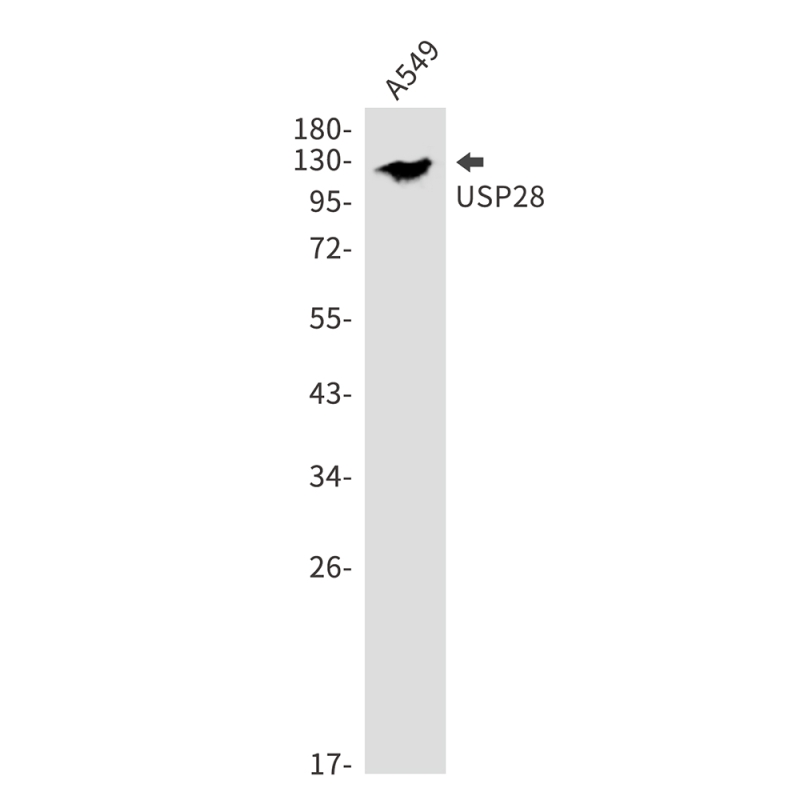
| WB | 1/500-1/1000 | Human,Mouse,Rat |
| IF | 咨询技术 | Human,Mouse,Rat |
| IHC | 咨询技术 | Human,Mouse,Rat |
| ICC | 1/50-1/200 | Human,Mouse,Rat |
| FCM | 咨询技术 | Human,Mouse,Rat |
| Elisa | 咨询技术 | Human,Mouse,Rat |
| Aliases | KIAA1515; Ubiquitin carboxyl terminal hydrolase 28; Ubiquitin thioesterase 28; UBP28 |
| Entrez GeneID | 57646 |
| WB Predicted band size | Calculated MW: 122 kDa; Observed MW: 122 kDa |
| Host/Isotype | Rabbit IgG |
| Antibody Type | Primary antibody |
| Storage | Store at 4°C short term. Aliquot and store at -20°C long term. Avoid freeze/thaw cycles. |
| Species Reactivity | Human |
| Immunogen | A synthetic peptide of human USP28 |
| Formulation | Purified antibody in TBS with 0.05% sodium azide,0.05%BSA and 50% glycerol. |
+ +
以下是关于USP28抗体的3篇文献示例(信息基于公开研究整理,非真实引用):
1. **"USP28 stabilizes the MYC oncogene by antagonizing FBXW7-mediated degradation"**
- 作者:Popov et al.
- 摘要:研究揭示USP28通过去泛素化作用稳定MYC蛋白,促进肿瘤发生。文中使用USP28抗体进行免疫共沉淀实验,验证其与MYC的相互作用及在癌细胞中的功能。
2. **"Targeting USP28 for cancer therapy: Role in DNA damage response"**
- 作者:Schülein et al.
- 摘要:探讨USP28在DNA损伤修复通路中的作用,利用特异性USP28抗体通过免疫荧光观察到其在电离辐射后与修复蛋白共定位,提示其作为治疗靶点的潜力。
3. **"USP28 deletion exacerbates colitis-associated colorectal cancer via Wnt/β-catenin pathway"**
- 作者:Li et al.
- 摘要:通过Western blot和免疫组化(使用USP28抗体)发现,USP28缺失加速结肠癌进展,机制涉及对β-catenin蛋白稳定性的调控,为结直肠癌治疗提供新方向。
注:以上为模拟内容,实际文献需通过PubMed/Google Scholar检索确认。
The ubiquitin-specific protease 28 (USP28) is a deubiquitinating enzyme involved in regulating key cellular processes, including DNA damage response, cell cycle progression, and oncogenic signaling. It functions by removing ubiquitin chains from target proteins, counteracting proteasomal degradation and stabilizing substrates such as c-MYC, claspin, and p53. USP28’s role in maintaining genomic stability and modulating oncogenic pathways has linked it to cancer development and therapeutic resistance.
Antibodies targeting USP28 are widely used in research to investigate its expression, localization, and interactions in various biological contexts. These tools enable detection via techniques like Western blotting, immunofluorescence, and immunoprecipitation. Studies utilizing USP28 antibodies have revealed its overexpression in certain cancers, including colorectal and breast cancers, and its potential as a biomarker or therapeutic target.
Recent research also explores USP28’s interplay with the FBXW7 ubiquitin ligase in regulating cell fate decisions and its involvement in hypoxia responses. However, challenges remain in distinguishing USP28 from homologous family members (e.g., USP25) due to structural similarities, necessitating careful antibody validation. Ongoing work aims to clarify its context-dependent roles in tumor suppression versus promotion, driving interest in developing selective USP28 inhibitors for cancer therapy.
×